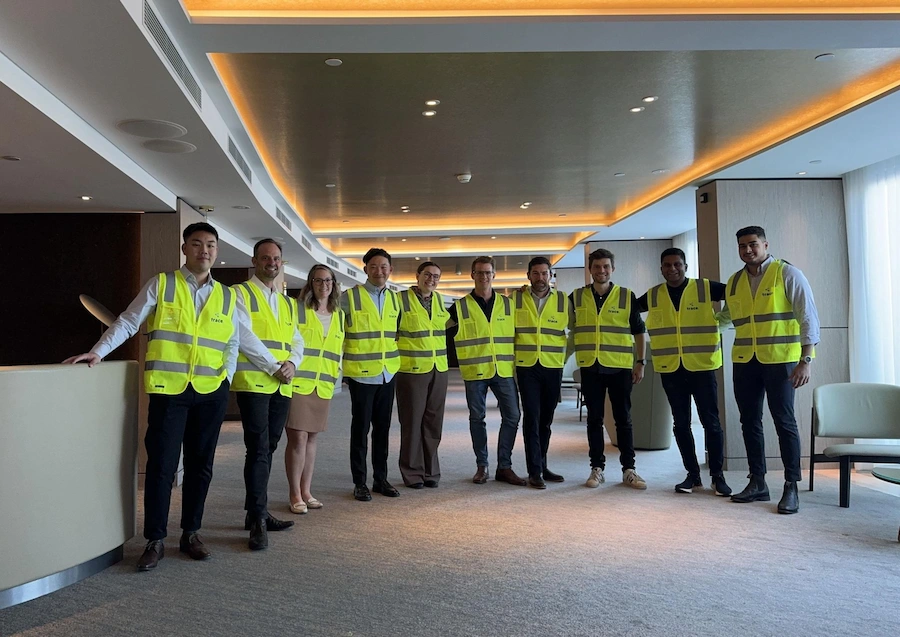Ready to turn insight into action?
We help organisations transform ideas into measurable results with strategies that work in the real world. Let’s talk about how we can solve your most complex supply chain challenges.

Introduction: AI’s Growing Impact on Sustainable Supply Chains
Sustainability is no longer just a buzzword—it has become a central priority for businesses worldwide. As consumers, governments, and investors place increasing pressure on companies to adopt sustainable practices, supply chains are under greater scrutiny to reduce their environmental footprint. For businesses in Australia and New Zealand, where sustainability is a significant focus, integrating eco-friendly practices into supply chains is crucial for staying competitive and complying with regulatory standards.
Artificial intelligence (AI) is playing a transformative role in helping organisations build more sustainable supply chains. AI-driven tools offer unprecedented insights, enabling businesses to optimise resource use, reduce waste, and lower carbon emissions across their operations. In this article, we explore how AI is enhancing supply chain sustainability, the benefits for Australian and New Zealand businesses, and how AI can help organisations meet their sustainability goals while maintaining operational efficiency.
The Growing Importance of Sustainability in Supply Chains
Sustainability in supply chains refers to the adoption of environmentally responsible practices that minimise the impact of supply chain activities on the environment. These practices include reducing carbon emissions, optimising energy consumption, minimising waste, and sourcing raw materials from ethical suppliers. For businesses, sustainability is not only a way to address environmental concerns but also a means of achieving cost savings, improving operational efficiency, and enhancing brand reputation.
In Australia and New Zealand, businesses face increasing pressure to adopt sustainable supply chain practices due to rising consumer demand for eco-friendly products, stricter government regulations, and global initiatives to combat climate change. However, implementing sustainable practices across complex and global supply chains can be challenging, particularly when it comes to tracking environmental impact, optimising resource use, and ensuring compliance with sustainability goals. This is where AI steps in to provide a powerful solution.
How AI Enhances Supply Chain Sustainability
AI-driven technologies can help businesses achieve their sustainability goals by providing real-time insights, automating resource optimisation, and enabling more efficient decision-making. Here are some key ways AI is enhancing supply chain sustainability:
- Optimising Resource Use
AI can analyse vast amounts of data from across the supply chain to identify areas where resources such as energy, water, and raw materials are being used inefficiently. By pinpointing inefficiencies, AI-driven tools can recommend adjustments to production schedules, transport routes, and warehouse operations that reduce resource consumption and lower environmental impact. - Reducing Carbon Emissions
AI can play a crucial role in reducing carbon emissions by optimising transportation logistics and production processes. AI-powered systems can analyse factors such as fuel consumption, delivery routes, and vehicle performance to suggest more efficient transport routes and fleet management strategies. This not only lowers fuel costs but also significantly reduces greenhouse gas emissions. - Minimising Waste
AI-driven tools can help businesses minimise waste by predicting demand more accurately and optimising inventory management. By reducing overproduction and excess inventory, AI enables businesses to produce only what is needed, thereby reducing waste from unsold products. AI can also be used to optimise recycling processes and manage reverse logistics more efficiently, ensuring that materials are reused or recycled where possible. - Supply Chain Transparency and Ethical Sourcing
AI-powered tools can enhance supply chain transparency by tracking and analysing data from suppliers and third-party vendors. This allows businesses to monitor the environmental impact of their suppliers, ensure compliance with sustainability standards, and identify opportunities for ethical sourcing. AI can also help organisations identify suppliers that align with their sustainability goals, reducing the risk of sourcing materials from unethical or environmentally harmful sources. - Predictive Maintenance for Sustainable Operations
AI can be used to predict when machinery or equipment in warehouses, manufacturing plants, or distribution centres will require maintenance. Predictive maintenance reduces energy consumption by ensuring that machines operate at peak efficiency, preventing breakdowns that lead to increased energy use and production delays. This proactive approach also reduces waste from faulty equipment or product defects. - Circular Economy Enablement
AI can support circular economy initiatives by optimising the reuse and recycling of materials. By analysing product life cycles, AI-driven tools can help businesses develop more sustainable production methods that extend product lifespans, facilitate product refurbishment, and promote the use of recycled materials.
Benefits of AI-Driven Sustainability for ANZ Businesses
Implementing AI-driven tools to enhance supply chain sustainability offers significant benefits for businesses in Australia and New Zealand. These benefits extend beyond environmental impact, helping organisations achieve operational efficiency, cost savings, and a stronger competitive edge:
- Cost Savings from Resource Optimisation
One of the most immediate benefits of AI-driven sustainability initiatives is cost savings. By optimising resource use, such as energy, water, and raw materials, AI enables businesses to reduce waste and lower their overall operating costs. For companies that rely on large-scale production or distribution networks, these savings can be substantial. - Lower Carbon Footprint and Compliance with Regulations
AI-driven tools help businesses track and reduce their carbon emissions, ensuring compliance with increasingly strict environmental regulations in Australia and New Zealand. With AI-powered insights, organisations can identify the most effective ways to reduce their carbon footprint, whether by optimising transport routes, improving energy efficiency, or sourcing from low-impact suppliers. - Enhanced Brand Reputation and Consumer Trust
Consumers are increasingly looking for businesses that prioritise sustainability, and companies that can demonstrate eco-friendly practices are more likely to attract and retain customers. AI-driven transparency in the supply chain allows businesses to verify their sustainability claims, providing consumers with the confidence that their purchases align with their values. This is particularly important in sectors like retail, food and beverage, and e-commerce, where consumer demand for sustainable products is on the rise. - Improved Supply Chain Agility
AI-driven tools enable businesses to respond more quickly to changes in demand or supply chain disruptions. By providing real-time insights into resource use and environmental impact, AI allows organisations to make more informed decisions about production, transportation, and inventory management, improving overall supply chain agility. - Sustainability as a Competitive Advantage
For businesses in Australia and New Zealand, where sustainability is a key differentiator, adopting AI-driven sustainability initiatives can provide a competitive edge. Companies that can demonstrate strong sustainability performance are more likely to attract environmentally conscious investors, secure government contracts, and build long-term relationships with eco-minded consumers.
Industry Applications of AI-Driven Sustainability
AI-driven sustainability initiatives are being implemented across various industries in Australia and New Zealand, helping businesses reduce their environmental impact and achieve operational efficiency. Here are some examples of how AI is enhancing sustainability in key sectors:
- Manufacturing and Industrial Operations
In the manufacturing sector, AI is being used to optimise resource use and reduce waste by predicting demand more accurately, automating production processes, and improving equipment maintenance. AI-driven tools also help manufacturers develop more sustainable product designs that reduce material waste and energy consumption. - Retail and Consumer Goods
AI is helping retailers and consumer goods companies optimise their supply chains by reducing overproduction, minimising waste, and improving inventory management. By predicting consumer demand with greater accuracy, AI-driven systems enable businesses to produce only what is needed, reducing the environmental impact of unsold goods. - Agriculture and Food Supply Chains
In the agriculture and food sectors, AI-driven tools are helping farmers optimise water and energy use, reduce food waste, and improve supply chain transparency. AI is also being used to track the environmental impact of food production, from farm to table, allowing businesses to demonstrate their sustainability credentials to consumers. - Transport and Logistics
AI-driven logistics systems are optimising transport routes, reducing fuel consumption, and minimising carbon emissions for businesses that rely on transportation networks. By using real-time data and predictive analytics, AI tools help transport companies identify the most efficient routes, reducing travel time, fuel use, and emissions. - Healthcare and Pharmaceuticals
AI is being used in the healthcare and pharmaceutical sectors to optimise supply chains for medical supplies and equipment, ensuring that essential products are delivered with minimal environmental impact. AI-driven tools also help healthcare providers reduce waste from expired medications and improve the sustainability of their procurement processes.
Implementing AI-Driven Sustainability: Key Considerations for ANZ Businesses
For businesses in Australia and New Zealand looking to implement AI-driven sustainability initiatives in their supply chains, there are several key considerations to keep in mind:
- Data Availability and Quality
AI-driven tools rely on high-quality data to deliver accurate insights into resource use and environmental impact. Businesses must ensure that they have access to reliable data from across their supply chain, including information on energy consumption, transport emissions, and supplier performance. Investing in data management systems is critical for successful AI-driven sustainability efforts. - Integration with Existing Systems
AI-driven sustainability tools should integrate seamlessly with existing supply chain management systems to ensure that insights are actionable. Businesses should assess their current technology infrastructure and determine whether upgrades or new systems are required to support AI-driven sustainability initiatives. - Collaboration with Supply Chain Partners
Achieving sustainability goals requires collaboration across the supply chain, including suppliers, manufacturers, distributors, and logistics providers. Businesses should work closely with their supply chain partners to share data and insights that enhance sustainability performance and ensure alignment with environmental goals. - Cost-Benefit Analysis
While AI-driven sustainability initiatives offer significant long-term benefits, businesses must conduct a thorough cost-benefit analysis to assess the potential return on investment (ROI). For many organisations, the long-term savings from reduced resource use, lower emissions, and improved operational efficiency will outweigh the initial investment in AI technologies.
How Trace Consultants Can Help ANZ Businesses Implement AI-Driven Sustainability
At Trace Consultants, we specialise in helping businesses across Australia and New Zealand integrate AI-driven sustainability solutions into their supply chains. Our team of supply chain experts works closely with organisations to develop customised sustainability strategies that reduce environmental impact, optimise resource use, and enhance supply chain performance.
Our services include:
- Sustainability Assessment and Strategy Development: We help businesses assess their current supply chain sustainability efforts and develop AI-driven strategies to achieve their environmental goals.
- AI Tool Implementation and Customisation: We work with organisations to implement AI-driven sustainability tools that are tailored to their specific needs and industry requirements. Our solutions are designed to optimise resource use, reduce waste, and lower carbon emissions.
- Training and Support: Our team provides training and ongoing support to ensure that businesses can effectively manage and interpret AI-driven sustainability insights. We offer continuous monitoring and optimisation of AI tools to ensure they deliver accurate and actionable results.
- Collaboration with Supply Chain Partners: We foster collaboration across the supply chain, ensuring that data and insights are shared with key stakeholders to enhance overall sustainability performance.
AI is playing a transformative role in enhancing supply chain sustainability by enabling businesses to optimise resource use, reduce carbon emissions, and minimise waste. For companies in Australia and New Zealand, where sustainability is a key focus, adopting AI-driven tools is essential for achieving environmental goals and maintaining competitiveness in the market. By leveraging AI to enhance supply chain sustainability, businesses can not only reduce their environmental impact but also improve operational efficiency, reduce costs, and enhance brand reputation.
Ready to turn insight into action?
We help organisations transform ideas into measurable results with strategies that work in the real world. Let’s talk about how we can solve your most complex supply chain challenges.









